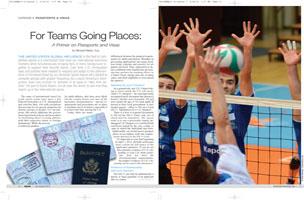
 The United States global influence in the field of competitive sports is a mechanism that fuels our international economic markets while simultaneously bringing fans of every background together to support their favorite teams. Over time, U.S. immigration laws and policies have needed to respond and adapt to this phenomenon of increased travel by our domestic sports teams who started to compete abroad with greater frequency. As a result, America’s immigration laws now provide for athletes of all ages to “take their talents” not just to South Beach, but all over the world, to see how they match up in the international arena.
The United States global influence in the field of competitive sports is a mechanism that fuels our international economic markets while simultaneously bringing fans of every background together to support their favorite teams. Over time, U.S. immigration laws and policies have needed to respond and adapt to this phenomenon of increased travel by our domestic sports teams who started to compete abroad with greater frequency. As a result, America’s immigration laws now provide for athletes of all ages to “take their talents” not just to South Beach, but all over the world, to see how they match up in the international arena.
The issue of international travel for youth sports teams rests upon a few bedrock principles in U.S. immigration and customs laws, rife with exceptions that account for its special situations for distinct groups of people. For our purposes, this article addresses the government sanctioned policies and procedures for facilitating travel of young athletes, with their respective teams, to foreign destinations. While the process is relatively painless for adult athletes, who have most likely left the country before and own all the necessary documentation—special requirements and procedures are in place to facilitate travel of minors, especially if it is their first time leaving the U.S.
Today, there are many differences between the passport requirements for adults and minors. Mistakes in processing applications can cause needless delay, expense and anxiety for all parties involved. Thus, inattention to detail combined with insufficient processing time can have far reaching effects on a team’s focus, energy, and in many instances, ruin their eligibility to even attend the game(s).
Applying for your Passport
As a general rule, any US Citizen looking to travel outside the US will need a valid US passport—the internationally recognized travel document that denotes a bearer’s identity and citizenship. All minors (under the age of 16) must apply in person at their local government or municipal agency office1 to fill out a Form DS-11: Application for a U.S. Passport.2
There is a host of required documents to fill out the DS-11 form, only one of which must be furnished. The easiest route is to use a previously issued, undamaged U.S. Passport or a certified birth certificate issued by the city, county or state in which the individual was born. Additionally, one would need a passport photo in accordance with size requirements denoted on the DS-11 form.
It’s important to note that beginning on April 1, 2011; all birth certificates must contain the full names of the applicant’s parent(s). If you do not have primary evidence of U.S. citizenship or your U.S. birth certificate does not meet the aforementioned requirements, Secondary Evidence of U.S. Citizenship can be used in the alternative.3
Evidence of Relationship with your Sponsor
The DS-11 can only be submitted by a parent or legal guardian of an applicant who is a minor. Sports agencies, coaches, teammates or other supporting team members may not apply on an applicant’s behalf. Accordingly, the parent/guardian must provide proof of their relationship with the applicant, again, with a range of acceptable documentation of which you only need to supply one. Acceptable documentation includes: Minor’s certified U.S. birth certificate with both parents’ names, Minor certified foreign birth certificate with both parents names (English translation needed, if in a foreign language), Minor’s Report of Birth Abroad with both parents’ names, Adoption Decree with adopting parents’ names, or a Court Order Establishing custody or guardianship.
It is important to keep in mind, previous U.S. Passports are not acceptable as evidence of relationship, and, evidence of a legal name change must be submitted, if the name of a parent/guardian has changed since the original document was issued.
 |
| Peter Muzslay/Dreamstime.com |
The parent/guardian’s information must also be present at the time of the minor’s application submission by attaching one of the following documents (Valid undamaged U.S. passport, drivers license, or naturalization certificate).4 These documents must be clearly photocopied and submitted along with the application in accordance with the DS-11’s procedural requirements for the quantity and quality of the specified document to be attached.
Finally, both parents must provide consent, authorizing passport issuance for a minor under the age of 16.5 Then, with the payment of applicable fees (specified on the DS-11) the application may be submitted and the processing can begin. Passports typically take 6-8 weeks to be processed, thus making this a matter for the off-season, to avoid delay at playoff time, where most international travel generally happens.
From within the United States, passport renewals may be completed by mail. You must submit a Form DS-82, Application for a U.S. Passport by Mail. You may locate Form DS-82 and follow the step-by-step instructions at the State Department’s website: www.travel.state.gov/passport/forms/ds82/ds82_843.html. As of February 2012, passport offices are processing routine applications in approximately 4-6 weeks from receipt of application.6
Minors, Aged 16 and 17
After turning 16, the rather cumbersome requirements for obtaining a passport gradually decrease. For starters, all minors, aged 16 and 17 can obtain 10 year passports rendering the number of parental documents needed for the minor’s validation practically unnecessary, assuming that at this particular age range, the applicant has proper identification, such as a drivers license.
When traveling by air between the U.S. and Canada, Mexico, the Caribbean or Bermuda, you are required to present a U.S. passport—subject to very few, limited exceptions. However, land travel—arguably the most common/cost-effective means of transportation by sports teams, does not necessarily need a valid U.S. passport when crossing North American borders.
Although the State Department has removed the passport requirement for teams with children under age 19, as a practical matter, it is rather imprudent (and time consuming) to go through this process when a wallet-sized passport can suffice.
Non-US Citizens
For Non-US citizens, the United States Citizenship and Immigration Services (USCIS) has provided that U.S. Lawful Permanent Residents (LPR’s) can continue to use their permanent resident card (Form I-551) or other valid evidence of permanent residence status for international travel. Additionally, these men and women will need to present a passport from their country of citizenship to travel to a foreign country. Take notice that the foreign country may have additional entry/exit requirements (such as a visa for travel to certain countries).8
On the return home, when arriving at a port of entry, a U.S. Customs and Border Protection Officer will review an LPR’s permanent resident card and any other identity documents present, such as a passport, foreign national I.D. card or U.S. Driver’s License, and determine if he can enter the United States.9
 |
| Tamara Kulikova/Dreamstime.com |
Pros/Cons of Expediting Passports
In emergency cases—usually instances when teams have unexpectedly achieved a significant degree of success during their respective seasons and are now invited to compete abroad—passport processing can possibly be expedited for additional costs. In the event that you need your U.S. passport in less than 2 weeks for international travel, or, need your U.S. passport within 4 weeks to obtain a foreign visa, your Regional Passport Agency center is available for such emergencies.10 This typically involves a laundry list of surcharges in addition to incurring expensive mailing and tracking procedures.11
Overall, the rather tedious requirements set up for minors to obtain passports is justified by the legal, ethical and policy considerations when moving large numbers of children across U.S. borders for sporting competitions—especially in this post-9/11 era of tightly regimented travel. Winning will always comes secondary to the safety of our country’s youth, who are already at risk of injury from strenuous and prolonged physical competition.
It is therefore vital that everyone involved in the team’s collective efforts obtain all proper documentation for international travel. The IDs, forms, and fees can be an unduly burdensome process without adequate time to organize and file these documents for processing. Teams have often been prevented from participating in international competitions on account of inadequate documentation presented at country borders. With adequate time, effort and organization by the players and coaching staff, teams can ensure their eligibility to travel wherever the competition takes them.
The time to act is now…Be proactive, not reactive.
1Many government buildings, including local municipal buildings or even US Post Offices provide this service, (See www.USPS.com/passport for all information you need including completing forms to expedite your visit to the post office)
2U.S. Passport applications can be found online at www.state.gov/documents/organization/79955.pdf Note however, that you must not sign the application until instructed to do so by the Acceptance Agent.
3See http://travel.state.gov/passport/get/secondary_evidence/secondary_evidence_4315.html for list of situations that may apply to your particular needs, if a facially valid birth certificate cannot be found.
4Check the state department website http://travel.state.gov for all other means of documentation.
5See http://travel.state.gov for details regarding further consent requirements and procedures.
6See http://www.travel.state.gov/passport/processing/processing_1740.html for more information on renewal and other processing fees
7See http://travel.state.gov for list of exceptions
8For information on foreign entry and exit requirements, see the Department of State’s webpage at www.travel.state.gov.
9For information pertaining to entry into the United States, see U.S. Customs and Border Protection’s webpage at www.cbp.gov
10See http://travel.state.gov/passport/npic/schedule/schedule_852.html: Make an appointment 24 hours a day, 7 days a week using their Automated Appointment System at 1-877-487-2778
11See http://www.travel.state.gov/passport/fees/fees_837.html#opt_services for list of passport fees

